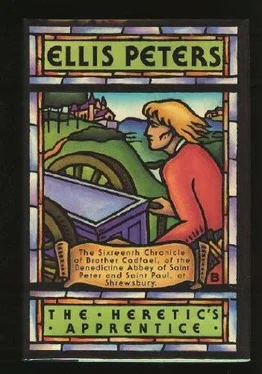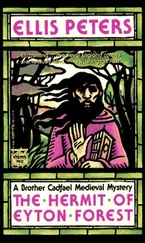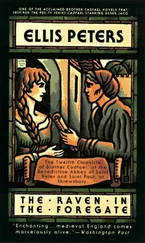Abbot Radulfus took two paces back from this encounter, very deliberately, and with so strong a suggestion of command that all those standing by also drew off silently, still watching wide-eyed. And Roger de Clinton, who could make up his mind about a man in a matter of moments, reached to grip Elave strongly by the hand and raise him from the ground, and stepping with an authoritative gesture from between Elave and the gate, said to the waiting porter: “Let him go!”
The workshop where Jevan of Lythwood treated his sheepskins lay well beyond the last houses of the suburb of Frankwell, solitary by the right bank of the river, at the foot of a steep meadow backed by a ridge of trees and bushes higher up the slope. Here the land rose, and the water, even at its summer level, ran deep, and with a rapid and forceful current, ideal for Jevan’s occupation. The making of vellum demanded an unfailing supply of water - for the first several days of the process, running water - and this spot where the Severn ran rapidly provided perfect anchorage for the open wooden frames covered with netting, in which the raw skins were fastened, so that the water could flow freely down the whole length of them, day and night, until they were ready to go into the solution of lime and water in which they would spend a fortnight, before being scraped clean of all remaining hair, and another fortnight afterward to complete the long bleaching. Fortunata was familiar with the processes which produced at last the thin, creamy white membranes of which her uncle was so justly proud. But she wasted no time on the netted cages in the river. No one would hide anything of value there, no matter how many folds of cerecloth were wrapped round it for protection. A faint drift of a fleshy odor from the soaking skins made her nostrils quiver as she passed, but the current was fast enough to disperse any stronger stench. Within the workshop the fleshy taint mingled with the sharp smell from the lime tanks, and the more acceptable scent of finished leather.
She turned the key in the lock, and went in, taking the key in with her and closing the door. It was heavy and dark within there, having been closed since morning, but she did not dare open the shutters that would let in light directly onto Jevan’s great table, where he cleaned, scraped, and pumiced his skins. Everything must appear closed and deserted. There were no houses near, no path passing close by. And surely now she had time enough, and no need for haste. What was no longer in the house must be here. He had no other place so private and so his own.
She knew the layout of the place, where the tanks of lime lay, one for the first soaking when the skins came from the river, one for the second, after both sides had been scraped clean of hair and traces of flesh. The final rinsing was done in the river, before the membranes were stretched over a frame and dried in the sun, and subjected to repeated and arduous cleanings with pumice and water. Jevan had taken in the single frame in use on his morning visit; the skin stretched over it felt smooth and warm to the touch.
She waited some minutes to allow her eyes to grow used to the dimness. A little light filtered in where the shutters joined. The roof was of thick straw thatch, sun-warmed, sagging a little between the supporting beams, and the air was heavy to stifling.
Jevan’s place of work was meticulously kept, but it was also overfilled, with all the tools of his trade, his lime tanks, nets in reserve for the river cages, piles of skins at various stages of manufacture, the drying frames, and racks of his knives, pumice, cloths for rubbing. He kept also a little oil lamp, in case he needed to finish some process in a failing light, and a box with flint and tinder, charred cloth and touchwood, and sulphur-tipped spunks for kindling it. Fortunata began her search by what light came in through the shutters. The lime tanks could be disregarded, but they were so placed as to shroud one end of the workshop in darkness, and behind them lay the long shelf piled with skins still at varied stages of their finishing. Easy enough to use those to shroud a relatively small box, it would lie between them with the untrimmed edges draped to hide it. It took her a long time to go through them all, for they had to be laid aside in scrupulous order, to be restored just as she found them, all the more if she was in error, and there was still nothing to find but the box. But it was far too late to believe in that. If it had been true, why hide it, why remove it from its place in his chest, and leave his breviary stripped of its splendid covering?
The faint, furry dust danced in the thin chink of late sunlight, and tickled her throat and nostrils as she disturbed skin after skin. One pile was gradually stacked back into place, the second began to be stripped down, fold by fold, but there was nothing there but sheepskins. When that was done, the light was failing, for the sun had moved westward and vacated the chink in the shutters. She needed the lamp in order to see into the dark corners of the room, where two or three wooden chests housed a miscellany of offcuts, faulty pieces worth saving for smaller uses, and the finished gatherings of leaves ready for use, from a few great bifolia to the little, narrow, sixteen-leaf foldings used for small grammars or schooling texts. She was well aware that Jevan did not lock these. The workshop itself was locked up when vacant, and vellum was not a common temptation to theft. If one of the chests was locked now, that very fact would be significant.
It took her a little time to get the touchwood to nurse a spark, and kindle grudgingly into a tiny flame, enough to set to the wick of the lamp. She carried it to the line of chests and set it on the lid of the middle one, to shed its light within when she opened the first. If there was nothing alien here, there was nowhere else to look, the racks of tools stood open to view, the solid table was empty, but for the key of the door, which she had laid down there.
She had reached the third chest, in which the waste cuts and trimmings of vellum were tumbled, but here, too, all was as it should be. She had searched everywhere, and found nothing.
She was on her knees on the beaten earth floor, lowering the lid, when she heard the door begin to open. The faint creak of the hinges froze her into stillness, her breath held. Then, very slowly, she closed the chest.
“You have found nothing,” said Jevan’s voice behind her, low and mild. “You will find nothing. There is nothing to find.”
Fortunata braced her hands upon the chest on which she leaned, and came slowly to her feet before she turned to face him. In the yellow gleam of the lamp she saw his face in white bone highlights and deep hollows of shadow, perfectly motionless, betraying nothing. And yet it was too late for dissembling; they had both betrayed themselves already, she by whatever sign she had inadvertently left at home to warn him, and by this present search, he by following her here. Too late by far to pretend there was nothing to hide, nothing to answer, nothing to be accounted for. Too late to attempt to reconstruct the simple trust she had always had in him. He knew it was gone, as she knew now, beyond doubt, that there was reason for its going.
She sat down on the chest she had just closed, and set the lamp safely apart on the one beside it. And since silence seemed even more impossible than speech, she said simply: “I wondered about the box. I saw that it was gone from its place.”
“I know,” he said. “I saw the signs you left for me. I thought you had given me the box. Am I still to account for whatever I do with it?”
“I was curious,” she said. “You were going to use it for the best of your books. I wondered that it had gone out of favor in one day. But perhaps you have found a better,” she said deliberately, “to take its place.”
Читать дальше












